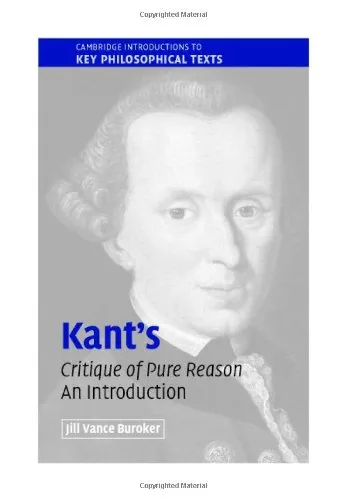Kants Critique of Pure Reason
4.6
Reviews from our users

You Can Ask your questions from this book's AI after Login
Each download or ask from book AI costs 2 points. To earn more free points, please visit the Points Guide Page and complete some valuable actions.Kant's "Critique of Pure Reason" is one of the foundational texts in Western philosophy and profoundly influences the landscape of modern thought. Authored by Immanuel Kant and published in 1781, this work seeks to address the limitations and scope of human understanding, while asserting a framework that bridges rationalism and empiricism.
Detailed Summary of the Book
The "Critique of Pure Reason" is divided into two main parts: the Transcendental Doctrine of Elements and the Transcendental Doctrine of Method. Kant endeavored to resolve the conflict between rationalist and empiricist philosophers by exploring the capabilities and boundaries of human cognition.
In the Transcendental Aesthetic, Kant introduces space and time as pure forms of sensible intuition, highlighting that our understanding of the world depends on these inherent frameworks. Next, the Transcendental Analytic dissects the functioning of the mind through categories of understanding, asserting that concepts without percepts are empty and percepts without concepts are blind.
The Transcendental Dialectic critiques the illusory nature of human reason when it steps beyond empirical experience. Kant analyzes the antinomies of pure reason, emphasizing the contradictions that arise when reason is misapplied to phenomena beyond empirical reach.
In his Transcendental Doctrine of Method, Kant focuses on the methodological principles guiding metaphysics and scientific knowledge, outlining the limitations of our purview and a compelling case for critical philosophy.
Key Takeaways
- Human knowledge is confined to the realm of possible experience, shaped by pre-existing categories and intuitions of time and space.
- The interplay of sensibility and understanding constructs knowledge, challenging previous philosophical assertions of inherent ideas.
- Kant's method mandates a critical examination of the foundational structures guiding knowledge acquisition and synthesis.
- Reason's speculative tendencies can lead to fundamental contradictions when it transgresses empirical boundaries, steering the need for methodological critique.
Famous Quotes from the Book
“Thoughts without content are empty, intuitions without concepts are blind.”
“All our knowledge begins with the senses, proceeds then to the understanding, and ends with reason. There is nothing higher than reason.”
“Act only according to that maxim whereby you can at the same time will that it should become a universal law.” (Often associated with the later "Critique of Practical Reason" but reflective of Kant's ethical theory.)
Why This Book Matters
The significance of "Critique of Pure Reason" extends beyond academic philosophy, permeating into various fields including science, religion, and art. Through a rigorous examination of epistemology, Kant challenges readers to reflect critically on the nature of knowledge, the confines of human understanding, and the role of experience and rational thought.
Kant's insights offer a systematic approach to philosophical inquiry that has sparked subsequent intellectual movements such as German Idealism and Phenomenology. By uniting elements of rationalism and empiricism, Kant provides a nuanced perspective that transcends binary notions, paving the way for contemporary debates on consciousness and cognition.
The work endures as a pivotal philosophical text that continues to inspire reflection and debate around the world. Its insistence on the marriage of empirical data with a priori knowledge reshapes the parameters of scientific discourse and ethical reasoning, maintaining its relevance over two centuries later.
Free Direct Download
You Can Download this book after Login
Accessing books through legal platforms and public libraries not only supports the rights of authors and publishers but also contributes to the sustainability of reading culture. Before downloading, please take a moment to consider these options.
Find this book on other platforms:
WorldCat helps you find books in libraries worldwide.
See ratings, reviews, and discussions on Goodreads.
Find and buy rare or used books on AbeBooks.
1267
بازدید4.6
امتیاز50
نظر98%
رضایتReviews:
4.6
Based on 0 users review
"کیفیت چاپ عالی بود، خیلی راضیام"


